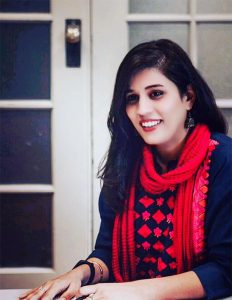 The first Multi Cultural Scholarship Program [MCSP], generously funded by CBA commenced in Melbourne in October 2017; giving an opportunity to develop the financial counselling skills of people from diverse backgrounds, building their capacity to provide information and support for members of their own communities. ICAN Learn’s Bernadette Pasco worked with a Multi Cultural Commissioner, Sonia Vignjevic to contact interested organisations; Women’s Health in the North [WHIN] referred Shazia Syed to ICAN Learn’s Diploma of Financial Counsellng program.
The first Multi Cultural Scholarship Program [MCSP], generously funded by CBA commenced in Melbourne in October 2017; giving an opportunity to develop the financial counselling skills of people from diverse backgrounds, building their capacity to provide information and support for members of their own communities. ICAN Learn’s Bernadette Pasco worked with a Multi Cultural Commissioner, Sonia Vignjevic to contact interested organisations; Women’s Health in the North [WHIN] referred Shazia Syed to ICAN Learn’s Diploma of Financial Counsellng program.
1. Tell us a little about yourself, how long you have been in Australia and why you decided to undertake the Diploma of financial counselling.
Shazia Syed came to Australia from Pakistan as a skilled migrant in 2016, with her husband and 4 year old son. Shazia has qualifications in political science and education.
“I am a very community minded person” says Shazia “I speak Urdu, Hindi and French/ Creole and got a job working with the Victorian School of Languages as a language instructor, faculty coordinator and course design. I ended up working with WHIN as a peer educator on a project called ‘Let’s Talk Money’, delivering financial literacy information to women in their own language.”
The Diploma of Financial Counselling gives Shazia more knowledge and understanding to use in her financial literacy work. Shazia’s family are incredibly proud of her achievements.
2. Are there any challenges in learning about financial counselling as a new Australian?
“When I was offered the opportunity for this course, I prepared myself and was very concerned that language might be a barrier; but once I came to the first classes and met my teachers, I relaxed and thought – ‘I can do it!’ “Shazia is undertaking her placement with an experienced financial counsellor at the Salvation Army and sees clients in Brunswick and Craigieburn. “When clients realise I know their language, they relax, tell me their problems, and we can do a lot of good work together.”
3. Tell us about how do you think your financial counselling knowledge will benefit people in your community?
“I am already seeing how financial counselling benefits many people in my communities; many people have health issues and I see financial issues like health problems – it’s a disease and when we fix the disease, people get better.”
“The people who come on skilled migration programs are skilled in their professions, but many don’t know how to stretch the money and get into financial trouble. When they learn about this and when financial counselling assists them with accessing their rights, things really improve for them.”
4. You are involved in financial literacy education- can you tell us a bit about the work that you do with WHIN and how this is impacted by your financial counselling knowledge.
“I’ve had a peer educator financial literacy education role at WHIN for 12 months and recently we had our AGM, and the program can continue. Being a peer facilitator is changing generations. With my new financial counselling knowledge, I can give women more understanding of their options and educate them about financial counselling. Practical debt solutions and understanding their financial rights and responsibilities is what people really need before they can make change to their financial behaviours. This work is changing generations.”
5. As a woman from a diverse background, what are the key things that will influence your work in financial counselling and capability, and what do you see as important for financial counsellors to focus on when working with multicultural clients / are there additional practice considerations?
Shazia says that all financial counsellors should have more training on different cultures. “as a financial counsellor, I also work with clients from other cultures with which I am not familiar; learning about the culture enriches our work and means we learn more about why problems occur. Then we can help educate to prevent harm and empower people to change ways of thinking and doing things.”
6. If there was one thing you could say about financial counselling sector development, what would it be?
“People don’t know about financial counsellors – everywhere; we need to tell more people about Financial counsellors and how they can help. Financial counsellors and financial literacy educators should be employed in every community services organisation in Australia- it would make a real difference to individuals and communities. When people come to Australia, access to financial literacy and financial counselling support is crucial to their wellbeing and success.”